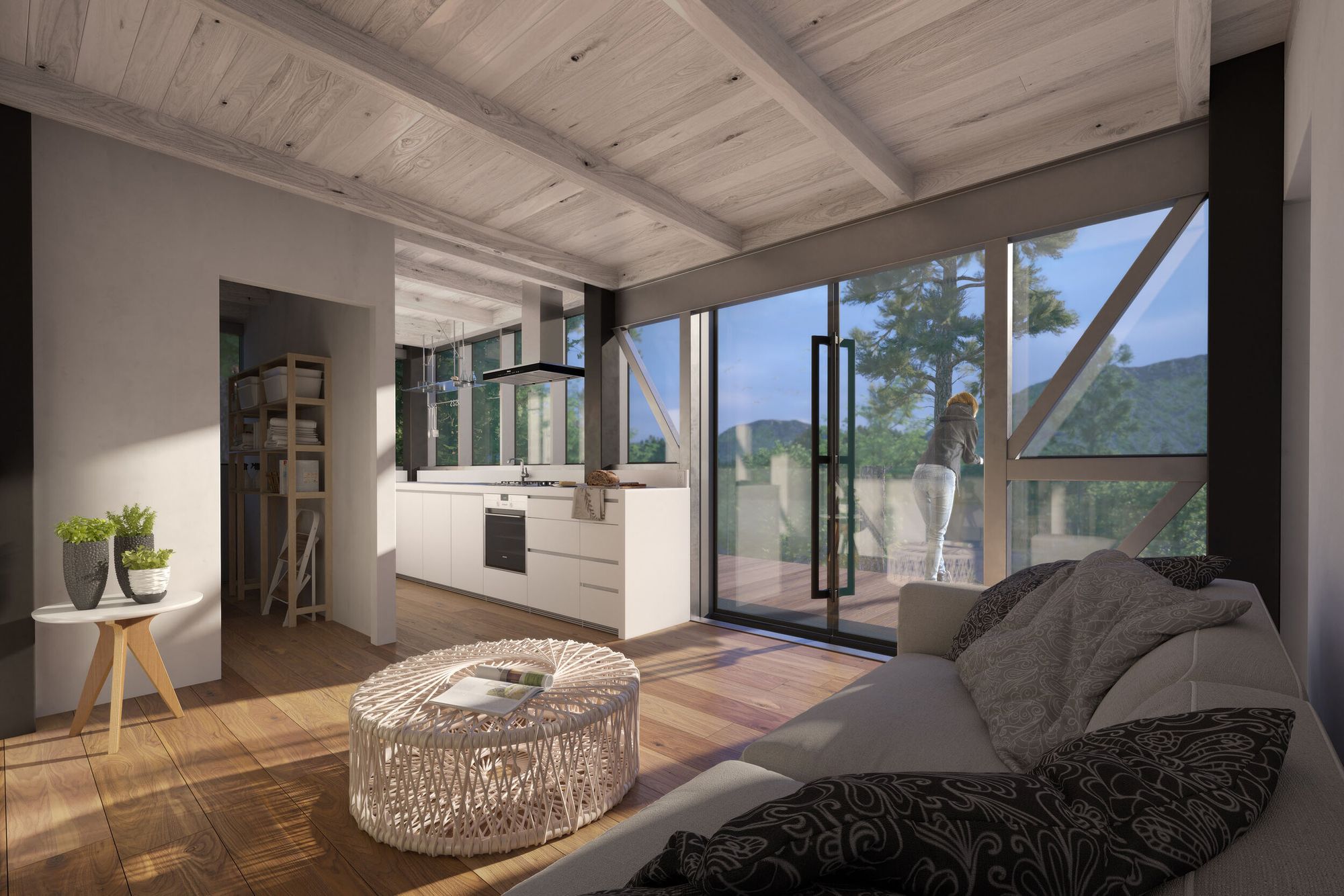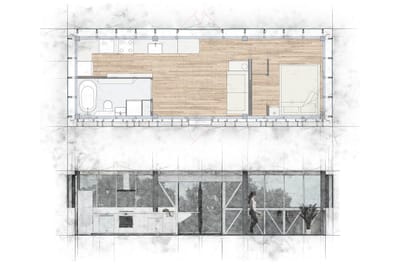Tiny Homes, Philosophy, et al. ia With Daniel Sanderson

Tiny Homes, Philosophy, et al. tia With Daniel Sanderson
The modern world is a creation of lopsided excesses. On the one hand, we have great material wealth that piles up around us, but on the other hand, we have a distinct lack of communication and discussion. We turn to philosophy to craft a better middle ground for our lives.
That is where Daniel Sanderson comes in. Daniel, the creator of the philosophy media outlet planksip and an idea contributor behind a new line of small dwellings, explores the deeper meanings behind our place in both the material world and our mindsets within this world.
Coming from the Listen and Chill podcast discussions, Daniel provides a unique outlook on life, business, and the tiny home's impact on the world.
Understanding Daniel Sanderson and His Philosophy
Daniel Sanderson has been through many things in his lifetime. His work as a consultant for many business firms, many of them architectural, has strengthened his belief in the fine detail work of communication and structure. His efforts in environmentalism have also helped him recognize and reorganize his space in cleaner and more efficient ways.
This comes through in his writing, as it flows with famous quotes and pinpoints perspectives on where life and modern society connect. There are long lists of quoted authors from many articles and discussions, which Daniel uses to highlight a particular structure of his thought.
Let's dive deeper into the three main points that help articulate his methods.
1. Peripatetic Philosophy
Peripatetic philosophy is a school of thought that came from Aristotle. The term peripatetic comes from the Greek word for walking, so the philosophy became associated with long strolls and winding conversations.
Daniel Sanderson's discussion on the Listen and Chill podcast was an exemplary method of this. As the discussion flowed from the subjects of business to philosophy and a host of other ideas, so too did Daniel move out into the countryside, enjoying the fresh air and scenery as he spoke.
This also reflects the philosophy of letting the talking points stroll into each other and come naturally with the conversation. This kind of thought allows each topic to help respond to the next, as often the commentary from the previous topic inspires the response of the following topic.
2. Foundations in Consulting
As mentioned, Daniel's work in business consulting greatly impacted his attention to detail and love of philosophy. For many business executives, philosophy is a powerful study, often a great undergraduate minor that helps add a foundation to business practices.
This works because philosophy deals with dissecting and understanding minute details. This can help you pick up on intricate business models or better engage with customer needs through CRMs. You have literal training in breaking down ideas and structures.
This connection between philosophy and business helps to create a mindset of weaving philosophy into everyday thoughts and practices. If dissecting the details of a conversation can help you connect with a client more, imagine what it can do to the dynamic flow of the structures of your life.
3. Crafting planksip and the Power of Philosophy
Daniel would need a proper platform to articulate these thoughts and discussions. Taking on his passion for reading and writing, planksip was born. This platform takes a wide variety of topics and uses many philosophical ideas to break down where they live in our everyday lives.
In one entry, he thinks about the death of Socrates and relates this moment to a reflection on where philosophers exist in our modern society. Socrates believed in every person as a philosopher, encouraging thought in every individual. Modern society doesn't promote this as much, so the discussion begins.
To emphasize this belief and method, let's dive deep into the philosophy of the tiny homes he helps to produce and see how philosophy can showcase why and how tiny homes can shape your life.
What Are Tiny Homes?
For unfamiliar people, tiny homes refer to houses built with smaller square footage than the usual homes. They are compact and space-efficient, letting you put all your home essentials into a small property space.
They also force a very conscious use of space and design. While working with high-end residential architecture firms, Daniel Sanderson made a discovery. High-money investors were creating luxury spaces that put up to three or four times the usual amount of detail and quality per square foot.
This made for residential areas that sold for millions of dollars. When you scale this level of detail and quality down to tiny home size, though, you move the price range back to mid-range affordable housing. This allows those aspiring to a luxury lifestyle to have one without the expense.
Tiny homes have become a cultural movement, with many DIY projects, tiny home startups, and a new brand of living that is environmentally friendly and easy on a budget.
Daniel pushes a mass-market appeal to the tiny home, crafting a modular setup from factory lines that infuse the high quality and detail of those luxury homes into the efficient space of the little houses. What makes his endeavors interesting is the philosophical mindset he adds to the small home culture.
Tiny Home Culture
The biggest reason why the cultural movement of tiny home living flows so well into what Daniel Sanderson pushes with planksip is that tiny home living requires a closer look at the wants and needs of your own life.
A lot of tiny home culture covers the idea of pairing down what you need out of a home, breaking down your requirements without sacrificing style or comfort. This philosophy builds an impactful focus on minimalism, environmentalism, and even economic success, all of which are powerful pieces of the personal goals Daniel works with on a daily basis.
Tiny Homes and Minimalism
Daniel discussed his passion for minimalism and how it pushes the tiny home concept in the Listen and Chill podcast discussion. Minimalism is a philosophy that seeks to reduce the excess that can accumulate in your life. While this often refers to worldly ideas, it can also be a way to declutter perceptions.
The example of important minimalism that Daniel spoke of was his lack of gift-giving. This wasn't a discouragement of any gift-giving, as obvious items of important significance still have a purpose. Instead, he spoke of gift-giving for the sake of gift-giving, which often accumulates a lot of unwanted or uninspiring clutter over time.
How does this concept best tie into tiny homes? In a small house, you have no room for clutter. Your space must always be efficient so you can narrow down to the items and concepts most important to your life.
When you pull apart and analyze every aspect and item of your life, you may often find how superficial that aspect or item may become. This helps sharpen your mind toward a more deliberate style of thought. Instead of items, you focus on experiences. Instead of seeking new things to own, you can seek new experiences with what you already have.
The minimalism enforced by tiny homes helps to push into the next idea, which is a drive for more vigorous environmentalism.
Virtual Environmentalism
Daniel's minimalist philosophy plays well into his passion for environmentalism. In a physical sense, cutting down on a consumerist mindset helps to reduce waste and clutter. In a mental sense, it allows us to dig through the unneeded add-ons in our lives, such as excess electricity usage through appliances.
The firm philosophy that Daniel advocates comes from a desire to push technology to promote a minimalistic mindset and reduce waste. Virtual calls have risen in popularity due to the lockdown from COVID-19. This technology helps keep the human connection going in troubling times, but it is also a strong example of improving your daily life without consumption.
Tiny homes are a first-hand test of this idealism. Technology helps compress many things we need to better fit into spaces like tiny homes. For example, the best heating technology helps to bring efficiency into a small space that an older heater system may not be able to. Most technology aims for miniaturization, which helps with space efficiency.
When we focus more on what we need and value, the waste from our lives starts to shrink, and we impact our environment with a simple shift in our priorities.
Efficiency in Economics With a Tiny Home
Daniel Sanderson's strong push toward a philosophy of betterment and minimalism adds more than a simple wish for more precise thinking or environmentalism. It also has a layer of business understanding, tying back to the importance of philosophy in the business world.
The most vital piece of financial advice that Daniel Sanderson gives is to understand your needs over your desires. The constant push for more and more wealth does not create a purpose but instead uses time for more impactful experiences. This means the money you save for something meaningful is your best investment.
You can try to push daily for necessary stock trades and ways to improve every detail of your money. Alternatively, you can instead remove the excess need from your life and lower the amount of wealth you need to get in the first place.
This is the perfect showcase of the tiny home and the original inspiration for Daniel Sanderson's variation on the little house. The models he helps to produce use the highest quality of materials and funnel them into an efficient design space. This lets you not cut out quality or value but excess and indulgence.
The tiny home mindset saves you a massive amount of money. Even without high-quality materials, living big in a tiny home means having the most impactful items and no waste of materials or money.
The Success and Failure of Life and Tiny Homes
Tiny homes have been a substantial success around the world. Daniel Sanderson sees this as a great example of a new, efficient mindset impacting our modern society. From the culture of the tiny home to the philosophy of minimalism, there has been a rise in the idea of questioning the details, and he is proud to be a part of crafting that new community.
You can see the success and failure that we have in life through a lot of lenses. The philosophy that Daniel aims for can give a lot of weight to the impact of building a community and streamlining your mindset.
He takes pride in his success with Planksip, which shows in his closing statements in the Listen and Chill podcast. Many view success as an overwhelming gain both in material wealth and influence. What both Tiny Homes and Planksip show for Daniel is that there is a lot more that comes from treasuring the minor details.
Adapting to a different way of life is the core aspect of philosophy. Raising questions and getting at the heart of each matter is a big benefit, and with it comes the realization that what was important and what was success could be shortsighted.
Delving Further Into the Philosophy Mindset
Tiny homes are only one of the ideas that take on a philosophical bent here on Planksip. Daniel Sanderson has a unique mindset on how to use philosophy and our very life structure as a jumping-off point for a wide variety of discussions.
Every aspect of our life, from our media consumption to how we set up our homes, has a philosophical discussion point. Embracing these is the primary goal of Daniel Sanderson and his creation of Planksip.
A significant number of discussions have already been posted. We encourage others to follow their discussions and passions. Are you eager to see where all of this leads? We work with other publishers like you to keep the idea flowing. Check us out.





